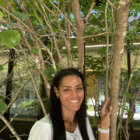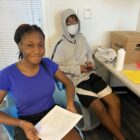Building Connections At UConn’s Rainbow Center
|
Trinity Ford, a senior year at the Cooperative Arts and Humanities High School in New Haven, writes for her school’s newspaper, is a member of the Journalism Club, and has published a book of short poems.
She also runs the school’s Instagram page. For her project at C-HIT’s multimedia journalism workshop, Trinity opted to try something different – video storytelling. She stopped by the Rainbow Center at the University of Connecticut and interviewed Christopher Richard, the center’s coordinator. https://youtu.be/BS_meOn0QcY





